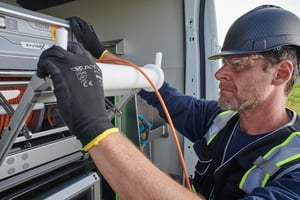The wastewater industry is facing a perfect storm that is leaving public works departments scrambling for workers. The industry’s aging workforce is approaching retirement age, and they will take decades of experience with them; meanwhile cash-strapped utilities are seeing budget shortfalls just as much of the nation’s wastewater infrastructure reaches a critical age. At the same time, fewer young people are pursuing careers in the trades. The looming labor shortage, however, has a silver lining for job seekers: A career in the wastewater industry can be both rewarding and lucrative.
 What Wastewater Professionals Do
What Wastewater Professionals Do
As with many careers in public works, wastewater professionals improve their community’s quality of life while safeguarding the environment. In many areas of the country, they also help with emergency response to extreme weather events, ensuring that essential services continue operating and streets and waterways stay clean.
Roles and responsibilities vary by the size of the wastewater system and the nature of the community it serves; a worker in a smaller municipality, for example, may take on a range of tasks, while those in a larger city may have more specialized duties. Common roles in wastewater systems include
- Collection System Inspection: Wastewater systems require regular inspections to confirm that pipes, manholes and other assets are working as they should. Municipal and private assessment crews spend a lot of time out in the field and work with specialized camera equipment.
- Cleaning: Grease, debris and sediment can build up in sewers, disrupting flow. Cleaning crews use heavy equipment to clear lines and keep things running smoothly.
- Rehabilitation: Rehab crews respond to maintenance orders, repairing lines that are cracked, corroded, or otherwise damaged. They must learn specialized processes to ensure repairs are efficient and effective.
- IT/coding: Today’s wastewater systems use inspection software, GIS, planning tools, and integrated asset management solutions—all of which rely on specialized tech support.
- Treatment plant worker: Treatment plants employ workers in a range of lab, instrumentation, technician, maintenance and management roles. They are responsible for inspecting equipment and monitoring operating conditions; collecting and testing water and sewage samples; and operating and adjusting equipment controls to ensure that sewage is disposed of properly.
- Management/supervisor: Depending on the size of the system or contracting company, management may oversee planning, job assignments, scheduling, planning and budgeting.
- Environmental engineer: Like any complex system, wastewater management requires planning, development and analysis. Engineers hold advanced degrees and certifications.
- Compliance, environment and QA/QC: A range of ancillary functions ensure that wastewater systems meet industry standards. Government regulators, engineers and third party testing professionals typically require specialized training.
Don’t underestimate the range of opportunities. “We’re in need of young people for this industry—water and wastewater,” Jeff Bailey, a wastewater treatment plant director, told the Municipal Association of South Carolina. “They look at it as a dirty job, but there’s electronics and gadgets involved. We’ve got engineering and cameras, drawings, blueprints, planning and development. I don’t think the kids realize how interesting it can be… you’ll move up, and you’ll get experience and training to do these jobs that we need.”
.jpg?width=300&name=Envirosight_03102021_0470%20(1).jpg) How to Enter the Wastewater Industry
How to Enter the Wastewater Industry
People who thrive in this industry tend to prefer practical, hands-on problems and solutions. Wastewater crews often work outdoors, exposed to weather and potentially hazardous conditions. Sewer systems are 24-hour operations: While inspections, rehab and management may typically keep regular hours, emergency call outs and treatment plant operation can require workers to be on call or on site evenings and weekends.
Entry-level jobs in wastewater usually require a high school diploma or the equivalent. While pay varies regionally; and the median annual wage for water and wastewater treatment plant and system operators was $49,090 in May 2020, with the highest 10% earning more than $79,620, according to the U.S. Bureau of Labor Statistics. Employees with wastewater contractors may earn even more, though they typically work less regular schedules and may travel for weeks at a time.
Wastewater is an industry known for identifying, investing in and mentoring people who start at the entry level; as employees gain expertise there are many opportunities for advancement and pay increases. With workers in high demand, people who are new to the industry can position themselves for a rewarding career in wastewater with a few key steps.
- Build a solid foundation of applicable knowledge and skills: While the level of education hiring managers look for depends on the specific role, industry professionals can progress in their careers by earning industry certifications. Engineers, IT experts and supervisors often have solid mathematical, analytical and mechanical skills in addition to an educational background in public administration, environmental science, or civil, structural or mechanical engineering.
- Consider a part-time or contract position to gain real-world experience: These roles can help someone who’s new to the industry or to a specific function get a foot in the door. This can be a great option if you learn more effectively on the job.
- Don’t forget about soft skills: Job postings in the wastewater industry increasingly list abilities like communication and the willingness and ability to learn. As one chief operator stated, “I need people who care about the job, realize the consequence of doing the job well and what happens if they don’t.”
Many of the men and women who have dedicated their careers in wastewater to protecting public health and their communities will be retiring over the next few years. As they do, they will create opportunities for new hires in an industry that offers not only significant potential for advancement but also the ability to make a difference.
Ready for a more in-depth introduction to the wastewater industry? Check out Sewer Maintenance 101: A Quick and Dirty Guide to Sewer Inspection and Upkeep, a free resource from Envirosight.

